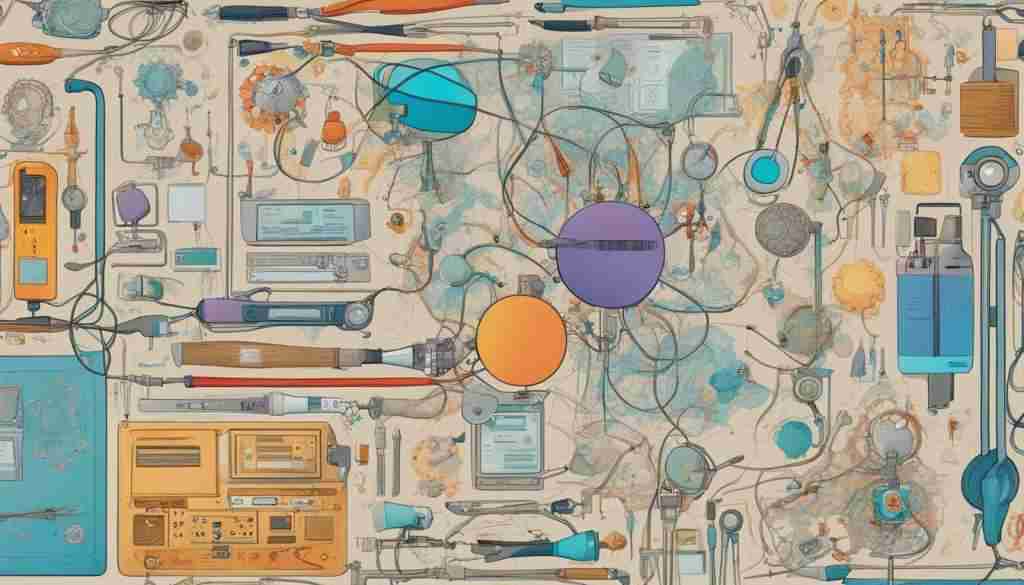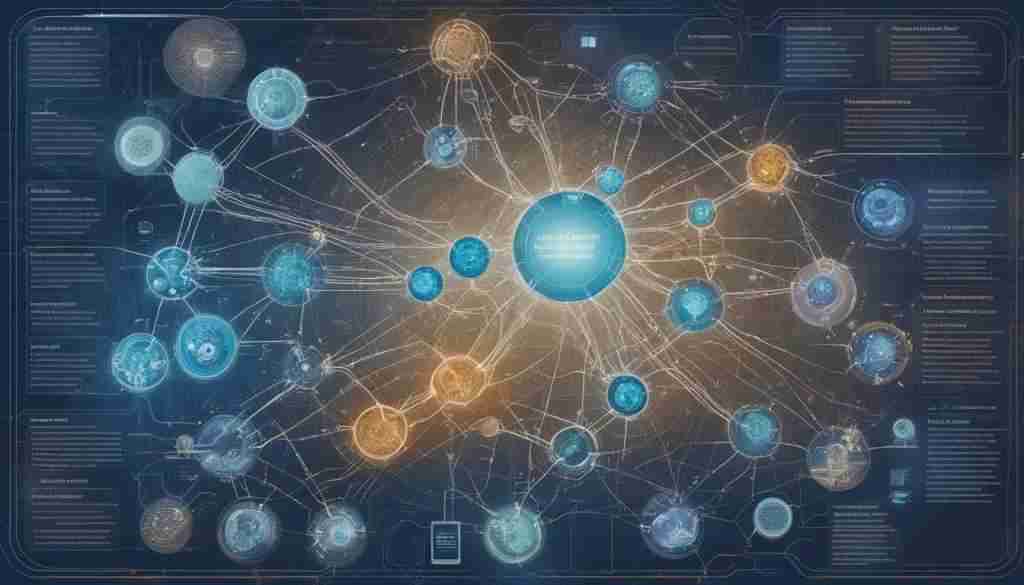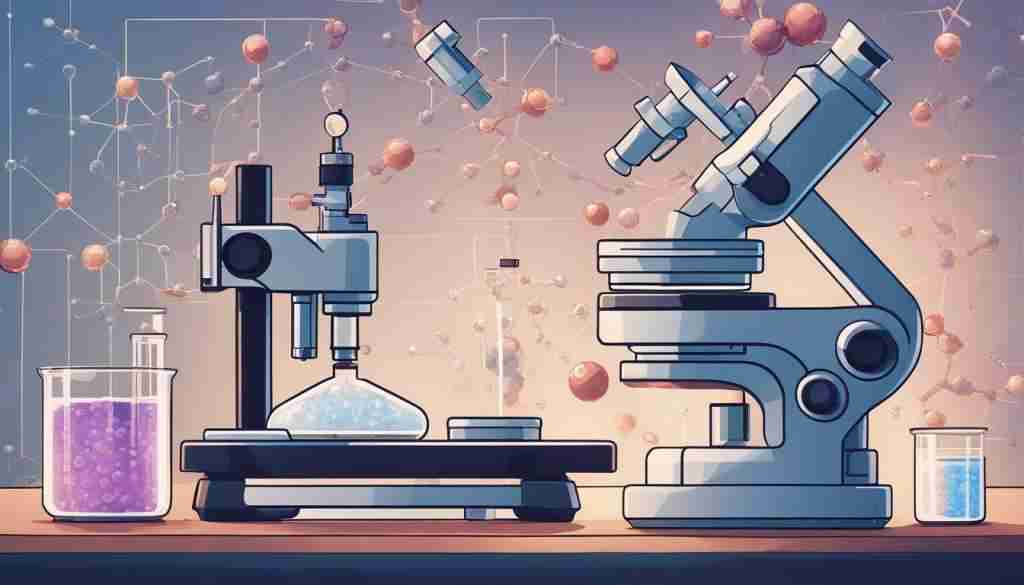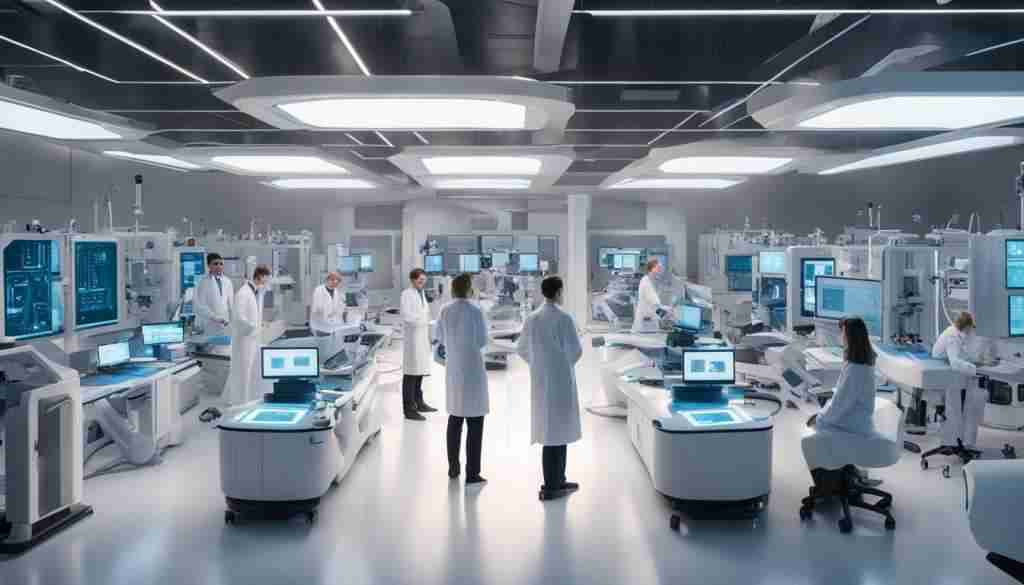Artificial intelligence (AI) is transforming healthcare as we know it, with new breakthroughs being made in AI-based medical research and development every day. From predictive modeling in healthcare to clinical decision support systems, AI has the potential to revolutionize patient care and optimize treatment outcomes.
The latest healthcare technology advancements are powered by AI, enabling medical professionals to analyze medical data more efficiently, develop new treatments, and improve patient outcomes. With AI becoming increasingly sophisticated, AI-based medical research and development is set to become a cornerstone of modern healthcare.
Key Takeaways
- AI-based medical research and development is revolutionizing the healthcare industry.
- The latest healthcare technology advancements are powered by AI, enabling medical professionals to optimize treatment outcomes.
- With AI becoming increasingly sophisticated, AI-based medical research and development is set to become a cornerstone of modern healthcare.
Machine Learning Algorithms in Healthcare
With the advent of AI-based medical research and development, machine learning algorithms have been increasingly adopted in healthcare to analyze medical data and enable predictive modeling. Machine learning is a subset of AI that focuses on developing algorithms that learn from data, identify patterns and make predictions based on that data.
In healthcare, machine learning algorithms are applied to various tasks such as medical imaging analysis, diagnosing diseases and predicting treatment outcomes. For example, machine learning algorithms can be used to analyze medical images and identify potential abnormalities that may have been missed by a human radiologist. Additionally, these algorithms can predict the likelihood of a patient developing a particular disease or the effectiveness of a particular treatment plan based on their medical history.
The use of machine learning algorithms in healthcare has the potential to significantly improve patient outcomes. By analyzing large amounts of medical data, these algorithms can identify patterns that are not immediately apparent to a human observer, leading to more accurate diagnoses and personalized treatment plans. However, the use of AI in healthcare also poses several challenges – including the need for robust data privacy and security measures, as well as the potential for bias in algorithmic decision-making.
Overall, the application of machine learning algorithms in healthcare holds great promise for improving patient care, facilitating medical research and development, and driving healthcare innovation forward.

Medical Data Analysis with Machine Learning Algorithms
One of the key applications of machine learning algorithms in healthcare is medical data analysis. Machine learning algorithms can analyze vast amounts of complex medical data, such as electronic health records and medical imaging, in a fraction of the time it would take a human to analyze the same data. By analyzing this data, these algorithms can identify patterns and trends that might be difficult for a human to detect, providing healthcare professionals with valuable insights into patient health and treatment outcomes.
For example, machine learning algorithms can be used to analyze medical images and identify potential abnormalities that might have been missed by a human radiologist. These algorithms can also analyze electronic health records to identify patients who may be at risk of developing a particular disease or to predict the likelihood of a patient responding to a particular treatment plan, based on their medical history and other factors.
Predictive Modeling in Healthcare
Predictive modeling is another key application of machine learning algorithms in healthcare. Predictive modeling involves making predictions about patient outcomes based on their medical history and other factors, such as age, gender, and lifestyle. Machine learning algorithms can be used to build predictive models that take into account a wide range of factors, providing healthcare professionals with valuable predictions about patient outcomes.
For example, machine learning algorithms can be used to predict the likelihood of a patient experiencing a particular side effect from a medication, based on their medical history and other factors. These algorithms can also be used to predict the likelihood of a patient developing a particular disease, based on their age, gender, lifestyle, and other factors. By providing healthcare professionals with this predictive data, machine learning algorithms can help improve patient outcomes and facilitate more personalized treatment plans.
Clinical Decision Support Systems
The use of artificial intelligence in medicine has led to the development of innovative clinical decision support systems (CDSS). These systems are designed to help healthcare professionals make informed decisions by providing them with real-time data and analysis of patient information.
CDSS powered by AI technology can effectively reduce errors and improve the quality of patient care. These systems can assist healthcare professionals in diagnosing diseases, developing treatment plans, and monitoring patient progress. CDSS can also help streamline medical workflows, resulting in more efficient and effective healthcare delivery.
One of the key benefits of CDSS is that they can process and analyze vast amounts of medical data quickly and accurately. This capability can have a significant impact on healthcare outcomes, particularly in cases where time is of the essence. AI-based CDSS can also identify potential medical issues before they become severe, allowing healthcare professionals to take proactive measures to prevent complications.
However, the use of CDSS also poses some challenges. One such challenge is the need for data security and privacy protection. Healthcare organizations must ensure that patient data is stored, processed, and analyzed securely. Additionally, CDSS may only be as effective as the data that is fed into them. Therefore, ensuring the accuracy and completeness of medical data is crucial to producing reliable results.
Overall, CDSS powered by AI technology is an exciting development in healthcare innovation. As healthcare technology advancements continue, we can expect to see even more sophisticated and effective CDSS in the future.

AI-Driven Drug Discovery
The use of artificial intelligence in drug discovery is transforming the pharmaceutical industry. AI algorithms, combined with biomedical informatics, are capable of handling massive amounts of data and identifying potential drug candidates faster than traditional methods. This has the potential to accelerate the drug discovery process and reduce costs.
One example of AI in drug discovery is the use of deep learning to predict the binding affinity between drug molecules and their target proteins. This approach can identify potential drug candidates and eliminate those that are unlikely to be effective, saving researchers time and resources.
Another application of AI in drug discovery is the use of machine learning to analyze large datasets and identify new drug targets. This approach can help researchers identify novel pathways for disease treatment and develop more effective drugs.
Overall, AI-driven drug discovery has the potential to revolutionize the pharmaceutical industry and improve healthcare outcomes. By accelerating the drug discovery process and identifying more effective treatments, AI is driving healthcare innovation and transforming the way we approach disease treatment.

Innovations in AI-based medical research and development, such as AI-driven drug discovery, are reshaping the healthcare landscape. As the field continues to advance, we can expect to see even more groundbreaking technologies and approaches emerge.
Cutting-Edge Innovations in AI-Based Medical Research and Development
With the increasing adoption of AI-based medical research and development, healthcare technology advancements are rapidly transforming the way healthcare is delivered. From enhanced diagnostic capabilities to personalized treatment plans, the potential of artificial intelligence in medicine is immense.
One groundbreaking innovation in AI-based medical research is the development of virtual assistants for medical professionals. These assistants use machine learning algorithms to streamline administrative tasks and improve the accuracy of patient data analysis. By freeing up time for physicians and other healthcare providers, virtual assistants can improve care delivery and reduce administrative burdens.
Another exciting development in AI-based medical research is the use of predictive analytics to improve patient outcomes. By analyzing vast amounts of medical data, AI algorithms can identify patients who are at high risk for certain conditions and help healthcare providers develop more targeted and effective treatment plans.
Advancements in AI-driven medical imaging are another area of innovation in healthcare technology. With the help of deep learning algorithms, medical imaging can now provide more accurate and detailed images for diagnosis, treatment planning and monitoring. This technology has the potential to significantly improve patient outcomes and reduce healthcare costs.
Additionally, AI-based medical research is also being used to develop new drugs and treatments faster and more efficiently. By using data mining and predictive analytics, researchers can identify potential candidates for drug development and accelerate the process of clinical trials.

As AI-based medical research and development continues to evolve, the potential for further groundbreaking innovations in healthcare is immense. By leveraging the power of artificial intelligence, healthcare providers can improve patient outcomes, reduce costs, and transform the way healthcare is delivered.
Conclusion
AI-based medical research and development is driving significant healthcare technology advancements and innovations, transforming the way we approach patient care. From machine learning algorithms to clinical decision support systems, AI is helping healthcare professionals make informed decisions and improve healthcare outcomes.
The application of AI in drug discovery and development is also accelerating the process of finding new treatments and medications, with the help of biomedical informatics. The potential for further advancements in the future is vast, and ongoing innovation in this field promises to reshape various aspects of healthcare, from diagnostics to patient care.
Healthcare innovation is evolving at an unprecedented pace, and AI-based medical research and development is a critical component in this transformation. As technology continues to advance, healthcare professionals will be able to deliver more precise and effective treatments to patients, improving overall healthcare outcomes for everyone.
FAQ
Q: What is AI-based medical research and development?
A: AI-based medical research and development refers to the use of artificial intelligence in the field of healthcare to improve medical practices, develop new treatments, and enhance patient outcomes.
Q: How does artificial intelligence contribute to healthcare technology advancements?
A: Artificial intelligence in medicine plays a vital role in advancing healthcare technology by enabling machine learning algorithms, clinical decision support systems, and AI-driven drug discovery, among other applications.
Q: What are machine learning algorithms in healthcare?
A: Machine learning algorithms in healthcare involve the use of AI to analyze medical data and make predictions. These algorithms can assist in diagnosing diseases, identifying patterns, and improving patient care.
Q: What are clinical decision support systems powered by AI?
A: Clinical decision support systems powered by AI are tools that provide healthcare professionals with relevant information and recommendations to aid in making decisions about patient care. They leverage AI algorithms to enhance clinical decision-making.
Q: How does AI contribute to drug discovery?
A: AI-driven drug discovery utilizes advanced algorithms and biomedical informatics to accelerate the development of new medications and treatments. AI can help identify potential drug candidates, predict their efficacy, and optimize the drug discovery process.
Q: What are some cutting-edge innovations in AI-based medical research and development?
A: There are various cutting-edge innovations in AI-based medical research and development, including AI-powered diagnostics, robot-assisted surgery, personalized medicine, and the use of AI in telemedicine.

Artificial intelligence (AI) is transforming healthcare as we know it, with new breakthroughs being made in AI-based medical research and development every day. From predictive modeling in healthcare to clinical decision support systems, AI has the potential to revolutionize patient care and optimize treatment outcomes.
The latest healthcare technology advancements are powered by AI, enabling medical professionals to analyze medical data more efficiently, develop new treatments, and improve patient outcomes. With AI becoming increasingly sophisticated, AI-based medical research and development is set to become a cornerstone of modern healthcare.
Key Takeaways
- AI-based medical research and development is revolutionizing the healthcare industry.
- The latest healthcare technology advancements are powered by AI, enabling medical professionals to optimize treatment outcomes.
- With AI becoming increasingly sophisticated, AI-based medical research and development is set to become a cornerstone of modern healthcare.
Machine Learning Algorithms in Healthcare
With the advent of AI-based medical research and development, machine learning algorithms have been increasingly adopted in healthcare to analyze medical data and enable predictive modeling. Machine learning is a subset of AI that focuses on developing algorithms that learn from data, identify patterns and make predictions based on that data.
In healthcare, machine learning algorithms are applied to various tasks such as medical imaging analysis, diagnosing diseases and predicting treatment outcomes. For example, machine learning algorithms can be used to analyze medical images and identify potential abnormalities that may have been missed by a human radiologist. Additionally, these algorithms can predict the likelihood of a patient developing a particular disease or the effectiveness of a particular treatment plan based on their medical history.
The use of machine learning algorithms in healthcare has the potential to significantly improve patient outcomes. By analyzing large amounts of medical data, these algorithms can identify patterns that are not immediately apparent to a human observer, leading to more accurate diagnoses and personalized treatment plans. However, the use of AI in healthcare also poses several challenges – including the need for robust data privacy and security measures, as well as the potential for bias in algorithmic decision-making.
Overall, the application of machine learning algorithms in healthcare holds great promise for improving patient care, facilitating medical research and development, and driving healthcare innovation forward.

Medical Data Analysis with Machine Learning Algorithms
One of the key applications of machine learning algorithms in healthcare is medical data analysis. Machine learning algorithms can analyze vast amounts of complex medical data, such as electronic health records and medical imaging, in a fraction of the time it would take a human to analyze the same data. By analyzing this data, these algorithms can identify patterns and trends that might be difficult for a human to detect, providing healthcare professionals with valuable insights into patient health and treatment outcomes.
For example, machine learning algorithms can be used to analyze medical images and identify potential abnormalities that might have been missed by a human radiologist. These algorithms can also analyze electronic health records to identify patients who may be at risk of developing a particular disease or to predict the likelihood of a patient responding to a particular treatment plan, based on their medical history and other factors.
Predictive Modeling in Healthcare
Predictive modeling is another key application of machine learning algorithms in healthcare. Predictive modeling involves making predictions about patient outcomes based on their medical history and other factors, such as age, gender, and lifestyle. Machine learning algorithms can be used to build predictive models that take into account a wide range of factors, providing healthcare professionals with valuable predictions about patient outcomes.
For example, machine learning algorithms can be used to predict the likelihood of a patient experiencing a particular side effect from a medication, based on their medical history and other factors. These algorithms can also be used to predict the likelihood of a patient developing a particular disease, based on their age, gender, lifestyle, and other factors. By providing healthcare professionals with this predictive data, machine learning algorithms can help improve patient outcomes and facilitate more personalized treatment plans.
Clinical Decision Support Systems
The use of artificial intelligence in medicine has led to the development of innovative clinical decision support systems (CDSS). These systems are designed to help healthcare professionals make informed decisions by providing them with real-time data and analysis of patient information.
CDSS powered by AI technology can effectively reduce errors and improve the quality of patient care. These systems can assist healthcare professionals in diagnosing diseases, developing treatment plans, and monitoring patient progress. CDSS can also help streamline medical workflows, resulting in more efficient and effective healthcare delivery.
One of the key benefits of CDSS is that they can process and analyze vast amounts of medical data quickly and accurately. This capability can have a significant impact on healthcare outcomes, particularly in cases where time is of the essence. AI-based CDSS can also identify potential medical issues before they become severe, allowing healthcare professionals to take proactive measures to prevent complications.
However, the use of CDSS also poses some challenges. One such challenge is the need for data security and privacy protection. Healthcare organizations must ensure that patient data is stored, processed, and analyzed securely. Additionally, CDSS may only be as effective as the data that is fed into them. Therefore, ensuring the accuracy and completeness of medical data is crucial to producing reliable results.
Overall, CDSS powered by AI technology is an exciting development in healthcare innovation. As healthcare technology advancements continue, we can expect to see even more sophisticated and effective CDSS in the future.

AI-Driven Drug Discovery
The use of artificial intelligence in drug discovery is transforming the pharmaceutical industry. AI algorithms, combined with biomedical informatics, are capable of handling massive amounts of data and identifying potential drug candidates faster than traditional methods. This has the potential to accelerate the drug discovery process and reduce costs.
One example of AI in drug discovery is the use of deep learning to predict the binding affinity between drug molecules and their target proteins. This approach can identify potential drug candidates and eliminate those that are unlikely to be effective, saving researchers time and resources.
Another application of AI in drug discovery is the use of machine learning to analyze large datasets and identify new drug targets. This approach can help researchers identify novel pathways for disease treatment and develop more effective drugs.
Overall, AI-driven drug discovery has the potential to revolutionize the pharmaceutical industry and improve healthcare outcomes. By accelerating the drug discovery process and identifying more effective treatments, AI is driving healthcare innovation and transforming the way we approach disease treatment.

Innovations in AI-based medical research and development, such as AI-driven drug discovery, are reshaping the healthcare landscape. As the field continues to advance, we can expect to see even more groundbreaking technologies and approaches emerge.
Cutting-Edge Innovations in AI-Based Medical Research and Development
With the increasing adoption of AI-based medical research and development, healthcare technology advancements are rapidly transforming the way healthcare is delivered. From enhanced diagnostic capabilities to personalized treatment plans, the potential of artificial intelligence in medicine is immense.
One groundbreaking innovation in AI-based medical research is the development of virtual assistants for medical professionals. These assistants use machine learning algorithms to streamline administrative tasks and improve the accuracy of patient data analysis. By freeing up time for physicians and other healthcare providers, virtual assistants can improve care delivery and reduce administrative burdens.
Another exciting development in AI-based medical research is the use of predictive analytics to improve patient outcomes. By analyzing vast amounts of medical data, AI algorithms can identify patients who are at high risk for certain conditions and help healthcare providers develop more targeted and effective treatment plans.
Advancements in AI-driven medical imaging are another area of innovation in healthcare technology. With the help of deep learning algorithms, medical imaging can now provide more accurate and detailed images for diagnosis, treatment planning and monitoring. This technology has the potential to significantly improve patient outcomes and reduce healthcare costs.
Additionally, AI-based medical research is also being used to develop new drugs and treatments faster and more efficiently. By using data mining and predictive analytics, researchers can identify potential candidates for drug development and accelerate the process of clinical trials.

As AI-based medical research and development continues to evolve, the potential for further groundbreaking innovations in healthcare is immense. By leveraging the power of artificial intelligence, healthcare providers can improve patient outcomes, reduce costs, and transform the way healthcare is delivered.
Conclusion
AI-based medical research and development is driving significant healthcare technology advancements and innovations, transforming the way we approach patient care. From machine learning algorithms to clinical decision support systems, AI is helping healthcare professionals make informed decisions and improve healthcare outcomes.
The application of AI in drug discovery and development is also accelerating the process of finding new treatments and medications, with the help of biomedical informatics. The potential for further advancements in the future is vast, and ongoing innovation in this field promises to reshape various aspects of healthcare, from diagnostics to patient care.
Healthcare innovation is evolving at an unprecedented pace, and AI-based medical research and development is a critical component in this transformation. As technology continues to advance, healthcare professionals will be able to deliver more precise and effective treatments to patients, improving overall healthcare outcomes for everyone.
FAQ
Q: What is AI-based medical research and development?
A: AI-based medical research and development refers to the use of artificial intelligence in the field of healthcare to improve medical practices, develop new treatments, and enhance patient outcomes.
Q: How does artificial intelligence contribute to healthcare technology advancements?
A: Artificial intelligence in medicine plays a vital role in advancing healthcare technology by enabling machine learning algorithms, clinical decision support systems, and AI-driven drug discovery, among other applications.
Q: What are machine learning algorithms in healthcare?
A: Machine learning algorithms in healthcare involve the use of AI to analyze medical data and make predictions. These algorithms can assist in diagnosing diseases, identifying patterns, and improving patient care.
Q: What are clinical decision support systems powered by AI?
A: Clinical decision support systems powered by AI are tools that provide healthcare professionals with relevant information and recommendations to aid in making decisions about patient care. They leverage AI algorithms to enhance clinical decision-making.
Q: How does AI contribute to drug discovery?
A: AI-driven drug discovery utilizes advanced algorithms and biomedical informatics to accelerate the development of new medications and treatments. AI can help identify potential drug candidates, predict their efficacy, and optimize the drug discovery process.
Q: What are some cutting-edge innovations in AI-based medical research and development?
A: There are various cutting-edge innovations in AI-based medical research and development, including AI-powered diagnostics, robot-assisted surgery, personalized medicine, and the use of AI in telemedicine.



